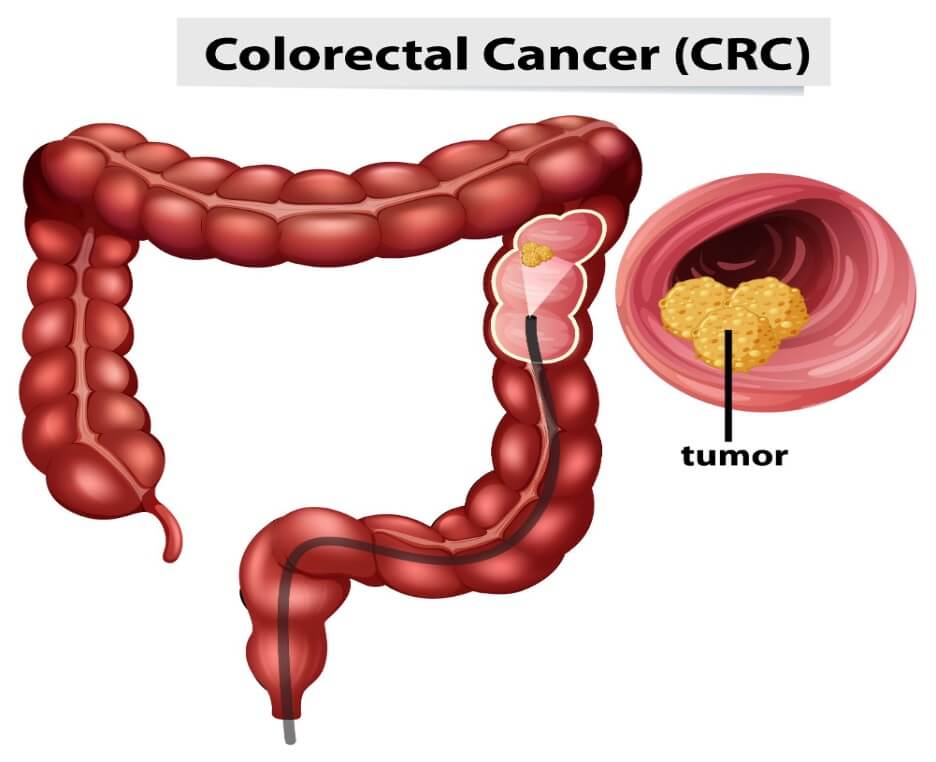In human emotions, hope is like a rock during a storm. It motivates us to keep going and works to bring us together as a community as we seek a brighter future. Today, we set out on a journey together to educate people about colon cancer, a disease that has the potential to strike dread but also offers hope for a successful outcome.
The large intestine (colon) is where the body absorbs liquid and salty waste products. The feces then travel via the rectum and out the anus. The rectal cancer begins in the rectum, the last few inches of the big intestine closest to the anus.
A person’s cancer risk rises when they are exposed to risk factors. Most risk factors do not cause cancer, but they increase the likelihood of cancer developing. While some people who share risk factors with others never end up getting cancer, others who share none of those risk factors do. Knowing your risk factors and having that conversation with your doctor could lead to better decisions about your health and wellness.
The average risk of having colorectal cancer is 5% in the general population. Most cases of colon cancer (about 95%) are considered sporadic, which means that the underlying genetic mutations occur independently after birth and pose little danger to future generations.

Colorectal cancer, which includes both colon and rectal malignancies, is extremely prevalent.
The incidence of colon cancer in India is tenth overall. Cancer of the colon affects the large intestine. Colon cancer is a disease that knows no boundaries of age or gender. Colon cancer can be fatal if left untreated but is curable if caught early. Therefore routine screenings are essential. Early detection of colon cancer is challenging because of the lack of symptoms.
The TNM Stages Of Colon Cancer
The American Joint Committee on Cancer uses the TNM method to classify colon cancer progression. Using the TNM classification system.
- T (T stands for tumor): This describes how big is the original tumor and how far it has grown into the colon wall.
- N (N stands for node): This indicates the original tumor size and the depth to which it has penetrated the colon wall.
- M (M stands for metastasis): It indicates whether the cancer has migrated beyond the colon to other organs.
Types of Colorectal Cancer
Although there are several subtypes of colorectal cancer, adenocarcinomas account for 95% of all cases. Adenocarcinoma is the most common type of cancer of the colon and rectum.
- Cancer of the mucus-producing cells lining the colon and rectum is called adenocarcinoma.
- Cancer of the intestines develops from cells that produce the hormone carcinoid.
- Cancer that begins in the interstitial cells of the Cajal lining of the gastrointestinal (GI) tract is known as a gastrointestinal stromal tumor (GIST).
- Lymphoma is a malignancy of the immune system that typically manifests itself in the lymph nodes. That tumor forms in the gastrointestinal tract, and it’s extremely uncommon.
- Rare colorectal cancers, known as sarcomas, develop from smooth muscle cells.
What causes colon cancer?

As of this writing, researchers have not pinpointed any one cause of colon cancer. A mutation in otherwise healthy cells could cause it. The cause of the mutation has not been determined.
However, the likelihood of acquiring colon cancer is significantly increased due to certain risk factors. We’ll talk about the dangers involved.
- Age: Colon cancer is more common in people over 50. Therefore, regular screening after age 50 is essential for early detection, although the incidence of colon cancer in younger age groups is also rising.
- Family history of colon cancer: You should get screened for colon cancer after age 50 or earlier if you have symptoms or have a history of colon cancer in your immediate family.
- Low fiber, high-fat diet: Diet is also linked to colon cancer. Colon cancer risk rises when one consumes a high-fat diet low in fiber and high in red and processed meat. Therefore, it is suggested to keep a healthy diet.
Diabetes, obesity, a sedentary lifestyle, excessive alcohol consumption, and smoking can also cause colon cancer.
- Excessive body fat storage.
- Not moving around much.
- Having a diet heavy in processed or red meat.
- Intake of tobacco products.
- Chronic binge drinking. Possessing type 2 diabetes.
- A hereditary disorder in one’s family, such as Lynch syndrome or familial adenomatous polyposis.
Colon cancer risk factors include diabetes, obesity, a sedentary lifestyle, and smoking.
What are the symptoms of colon cancer?
Despite individual variation, the following are some of the most typical symptoms of colon cancer:
- Trace amounts of blood in the toilet or rectal hemorrhaging
- Abdominal ache, bloating, and cramping that won’t go away
- Weakness
- Rapid and seemingly random weight loss
- Constipation, diarrhea, or other alterations in bowel regularity
- Satiety; a sense of fullness in the stomach
If any of these symptoms linger for an extended time, seeing a doctor and getting checked out is important. There may be no outward signs of cancer in its first stages.
After the age of 50, screening is typically advised. However, if other risk factors are present, doctors may advise screening before age 50.
Diagnosis for symptoms of colon cancer?
Colorectal cancer symptoms and suspicion may lead your doctor to suggest the following tests and procedures:
- A complete physical examination that incorporates a digital rectal probe
- A test is administered on feces to detect cancer or other diseases. To check the blood
- Colonoscopy for polyp detection and removal from the entire colon and rectum
- Proctoscopy for colon cancer screening
- A tissue sample is removed for analysis in a lab to rule out malignancy
- Scans (ultrasound, MRI, CT) used for diagnosis
Once colon cancer has been diagnosed, it is “staged” according to the size of the tumor, the presence or absence of lymph node involvement, and the extent to which cancer has progressed to distant lymph nodes and other organs. Cancer at stage 0 is at its earliest stage, whereas cancer at stage 4 is at an advanced stage, having spread or “metastasized.”
After getting colon cancer, can a person live for a long time?
Patients typically recover and lead typical lives again. We have demonstrated that some patients with early-stage cancers, such as colon cancer, have greater survival rates than the overall population. When the survival of cancer patients is measured against that of the general population of people of the same age, sex, and race, the difference is referred to as relative survival. This is probably due to your regular visits to the doctor for checkups and other preventative care. Many people gain a newfound appreciation for their health after a precancerous colon cancer diagnosis.
Patients with more advanced stages of colon cancer have shorter life expectancies unless we can ensure that the disease does not recur following treatment. Then they should have a lifespan similar to the general population.
Those with colon cancer and no recurrences should expect to live as long as they would have without the disease.
If the cancer returns, the patient’s lifespan will be affected by the available treatment options. Surgery has a high success rate for curing patients who have experienced a recurrence. More and more effective treatments are making long lives possible, even for people who aren’t candidates for surgery.
Treatment for colon cancer?
Colorectal cancer treatment options are condition-specific and based on factors like cancer’s stage and where it has spread. However, surgery is frequently the first line of defense. The extent of the polyp and the presence of metastases will determine the surgical approach taken. If the cancer is in an early stage and contained within a polyp, it may be removed via a colonoscopy.
Colectomy, in which the colon is surgically removed, may be necessary for patients with more advanced cancer. A colostomy or ileostomy may be necessary if the colon or rectum is afflicted. These procedures cut a hole in the stomach through which waste is collected in a bag worn outside the body.
Possible treatments include chemotherapy, radiation therapy, medication therapy, and immunotherapy.
Can colon cancer be prevented?
Age and family history are two unavoidable colon cancer risk factors. However, identifying and modifying modifiable aspects of your lifestyle can reduce your chance of developing colon cancer.
To lower your risk, you can do the following right now:
- lowering one’s intake of red meat
- Keeping away from hot dogs, deli meats, and other processed meats
- more plant-based diet
- lowering fat intake
- If your doctor advises you to lose weight, you should exercise daily.
- Giving Up Smoking
- cutting back on booze
- alleviating strain controlling diabetes that already exists
Yet another safety precaution? After turning 45, you should consider scheduling a colonoscopy or other cancer test. The prognosis improves with an earlier diagnosis of cancer.
Conclusion Outlook
The path through colon cancer’s phases, preventative measures, and treatment options has been difficult. Despite the daunting nature of this illness, there is cause for optimism. We have discussed how cancer screenings can save lives, the effectiveness of preventative measures, and how medical advances have changed the face of cancer treatment.
The American Cancer Society (ACS) uses a 5-year survival rate that varies by colon cancer stage to estimate a patient’s likelihood of survival:
- localized: 91%
- regional: 72%
- distant: 14%
- all stages combined: 63%
These survival estimates, however, only cover the years 2008–2018, and medical science and practice are rapidly advancing. The prognosis of a person with colon cancer can be greatly improved via early detection and treatment.
When dealing with colon cancer, picking the right medical center can make a difference. Despite the prevalence of conventional medicine, another option has been gaining attention recently. Hyderabad is also home to the best cancer hospital in Hyderabad, offering a holistic approach to treatment that combines ancient wisdom with modern techniques.Among the top contenders is the best cancer hospital in Bangalore, where skilled oncologists work tirelessly to provide tailored treatment plans that address individual needs. Their multidisciplinary approach ensures patients receive the best care, from surgical interventions to chemotherapy and radiation therapies.
